- Home
- Linda Nagata
Limit of Vision Page 2
Limit of Vision Read online
Page 2
But not soon enough for Gabrielle.
When Virgil looked again, new words had replaced the old ones on his farsights:
→ Remember the Lovs, Virg. HER Lovs. The coroner could find them.
Panwar had found the arrow to pierce Virgil’s confusion. He sat up. His hand fell to his side. Every communication their farsights handled was encrypted and passed through anonymous servers, protecting them from pirate spammers and data thieves. Most farsights worked that way, producing messages that were untraceable and unreadable except by their intended recipient. Virgil felt grateful for that security as he scanned Panwar’s next message.
→ You see it now, don’t you, Virg? EVERYTHING is at stake.
Nash glanced over at Virgil, his hairless brow furrowed in concern. “Better now, son?”
Virgil said: “I think so.” His voice was hoarse and thick with grief, but he was thinking again.
“It’s an unimaginable thing,” Nash said. “I can’t tell you how sorry I am.”
Virgil’s hand rose again to his forehead, this time to touch the tiny glass shells of his implanted LOVs.
More words appeared in his field of view:
→ Answer him.
Virgil shook his head. Unimaginable. He turned to Nash. “What was she doing there? That’s what I can’t figure out.”
“She wasn’t scheduled to be in?”
“No. We had all agreed to take the weekend off. She was supposed to meet us at the retreat.”
“Maybe she had a private experiment under way,” Panwar said, his voice low, angry, coming from the blackness of the backseat.
Nash frowned. “Was competition a problem?”
It took a moment for Virgil to understand what he was asking. “God no! We got along fine.”
“That’s right,” Panwar said. “Of course there was competition. There always is at this level, but we understood one another.”
Nash spoke delicately: “Gabrielle had been working hard. All of you had. I’ve seen your logs. You’re all utterly dedicated to your work. Sometimes that’s good, but sometimes … it inflates the importance of what you’re doing. Had there been any … setbacks recently? Something that might have … disturbed her? Disappointed her? Nothing was mentioned in your last report, I know, but …” He let his question trail off.
Virgil stared at the rain shooting down through the headlights, momentarily hating Nash for asking such a thing. “She was happy,” he said, each syllable crisp. “There were no setbacks. And if there were, she would have handled them. She was tough, Nash. Smart.” Beautiful. Virgil could almost taste her skin; feel its softness beneath his lips.
Never again.
“Sorry,” Nash said. “I had to ask.”
Virgil turned to look out the side window at traffic flowing in parallel lanes and the black wall of rain forest beyond it. On the screen of his farsights, Panwar nodded.
→ Good man. Now think.
Virgil didn’t want to. But Panwar was right, damn him. If Gabrielle’s implanted LOVs were discovered, they could lose everything. Their jobs. Their freedom.
Their own LOV implants.
That frightened him most of all. The implants were part of him now. Taking them away would be like taking away part of his mind—
Focus!
Keeping his right hand low against his thigh, Virgil started tapping codes, trying to remember the procedure for sending typed messages. His ROSA—his ROving Silicon Agent—appeared onscreen, ready to help him. A ROSA was an artificial intelligence program personalized for its user. Virgil’s ROSA appeared as a tiny, idealized woman of ancient Greece, her tawny face framed in iridescent hair. He called it Iris.
Iris whispered questions. Virgil tapped his responses, and a keyboard display appeared. After that it was easy. All he had to do was gaze at a letter. Iris would place it on a working line. With three or four letters in place the ROSA could usually guess the remainder of the word. Sometimes it only took one or two.
He typed:
♦ The only danger—if they find her Lovs.
The answer came back immediately.
→ Exactly.
♦ Will coroner ask questions? Should assume body jewelry.
→ Maybe. Maybe not. But if Nash looks close, he’ll know.
Virgil gave a slight, negative shake of his head and typed:
♦ Squeamish. Won’t look close.
→ Bet your life?
Virgil sighed, pressing his head against the cold glass of the side window. It came to exactly that, didn’t it? Gabrielle was gone and all they could do now was try to save themselves.
♦ WHAT HAPPENED TO HER???
→ Later!!! Now, LOVS! Have to extract, before body’s removed. How?
♦ HER body, Virgil reminded, sending the little jibe without really thinking.
Panwar glared at the words. Then his eyes darted as he composed a retort
→ Fuck you V. Think I don’t care?
Virgil leaned against the seat back, trying to slow the beating of his heart. Her skin had been like cinnamon cream; her breasts smooth and full, the nipples honey brown.
“You were very close to her, weren’t you?” Nash asked, his voice low, and a touch embarrassed. He cleared his throat. “I wouldn’t ask this, except … the investigation. They’ll want to know. Were you … lovers?”
Virgil shook his head. Then he shrugged. In a choked voice he answered, “Sometimes.”
Panwar’s image displayed comical surprise. Then the expression vanished like hail on a hot street. His black eyes radiated a terrible anger. Aloud he said, “I didn’t know.”
In typeface he added,
→ You bastard.
♦ She wanted it private.
→ You used Lovs?
Virgil stared straight ahead, not wanting to answer, not wanting to remember what was lost, but Panwar wouldn’t let it rest.
→ Answer me!
♦ Yes then! Yes, yes, yes!
Her LOVs had spoken to his in a closed loop of enhanced emotion. Never had he felt more connected with another human being.
No response came from Panwar, not right away. He brooded as they descended into the city. A few minutes later, Nash took the off-ramp to H-1. Traffic was almost bumper-to-bumper, but it hadn’t come to a stop yet. Virgil watched the skyscrapers slide by, until they reached the exit to downtown. The EquaSys building was only a few blocks from the waterfront. Virgil looked for it, picking it out from the surrounding towers. Gabrielle would be there.
New words printed themselves across his field of view:
→ Only one thing matters now, Virgil Copeland. If anyone discovers Gabrielle’s Lovs, both of us are good as dead. Remember that! And don’t fuck up.
Virgil didn’t answer. Nash stopped at the security gate to the underground garage. The guard stepped out of his booth to scan their faces. Virgil ignored the formalities. At the bottom of the ramp, parked beside the elevator bank, were two squad cars and a coroner’s white van.
chapter
2
IN THE FISH market at Can Tho a two-foot river carp lay on the chopping block while a diminutive housekeeper argued with the knife-wielding saleswoman for a better price. It was a common scene in the Mekong Delta of southern Vietnam, but it still made good video. Ela Suvanatat was using her farsights to record surreptitiously the early-morning dispute when the icon of her job broker appeared on the net goggles’ interactive screen.
Ela caught her breath, certain this link would be about the article she had prepared for Nine Dragon Daily. For two years, she had worked as a freelance producer, creating video articles for regional magazines. Her job broker was supposed to find her new assignments, but things had been slow lately. Ominously slow. Let this be good news, Ela thought. Please. She couldn’t help totting up in her mind the change left on her debit cards. Not enough to eat tonight, at least if she expected to pay for her room. She would have to start selling equipment soon.
She turned away from
the market’s gossiping heart, looking for a place quiet enough for conversation. She found it in a few inches of free space at a wooden railing that overlooked a canal. Her intrusion earned her an angry stare from a young woman who squatted there, selling frog-meat filets, but Ela ignored her. As a foreigner, she was used to stares.
Ela was half-Thai, and half some unknown European vintage that had boosted her height past five-seven. At nineteen she could be described as lithe as a dancer—or freakishly tall and skinny, depending on one’s idea of beauty. It was easy to guess which view the frog woman held.
Looking out over the water, Ela tapped a code with her thumb and fingers, using her implanted microchips to accept the link. Joanie’s image appeared on Ela’s screen, head and shoulders only, overlaid against the bustle of wooden boats plying the canal. “Joanie? Did you hear from Nine Dragon? Did they like the article?”
Joanie was a pale, blunt-faced Chinese woman who always dressed in black. “Ela! Oh yes. They liked the article a lot …”
“But they didn’t buy it.”
“They didn’t buy it,” Joanie agreed. “The editor feels your work is too … sophisticated for the market he serves.”
Ela’s hands squeezed the fish-slippery railing. “Sophisticated? What is that supposed to mean? That my work assumes too much from the viewer? Or it’s just boring?”
“No, Ela, no. This is not criticism. Your work is wonderful. Passionate. Both in image and in voice. But not everyone has the benefit of your education.”
Ela shook her head. She had gotten her education free off the net from corporate sponsored schools. She’d learned fluent English by reading and listening to pirated books and magazines. Now her work was too intellectual and passionate for an affluent regional magazine? The journalism prize that had bought her passage out of Bangkok suddenly seemed a joke. She was supposed to be smart, so why was she always broke?
“All right,” Ela said, her voice low and very controlled. “You’re saying I need to adopt a simpler style.”
“No. Your style is beautiful, just as it is. And besides … viewers always know when you’re talking down to them. “
“Then what are you saying? That I can’t produce a dumb enough vid for the big markets?”
“You’re too bright for them, Ela. There’s a lot more fluff than substance in the world. You’ve just never been good with the fluff.”
Ela’s throat felt dry despite the humid air. “I did the piece on spec, Joanie. Can’t you market it somewhere else?”
“Well of course I’m trying …”
“But you don’t think it will sell.”
“This is not the end,” Joanie said. “It’s not our last shot. The Coastal Society article is still open after all, and you’re perfect for it. The editor wants you to do it.”
Ela turned her back to the railing, meeting again the glare of the frog woman. She returned it in full measure.
The Coastal Society was an environmental charity looking for a propaganda article on the impact of overfishing on the coastline of the Mekong Delta. To Ela, it was the literary equivalent of burger-flipping, only for less money. She had twice refused the assignment already. “That article’s still open because there’s no one else in this miserable shit-swamp of a country who would consider doing it at the fee they’re offering!”
Joanie looked apologetic. “It’s all I’ve got right now.”
Ela made a fist at the frog woman and won some small satisfaction when she looked away.
If she accepted this project, it would mean a two-day trip to the coast. She would need to hire a boat and rent diving equipment. Along the way there might be bribes, or “taxes” to pay so that by the time she got back to Can Tho there would be little money left. Certainly not enough to get her out of the country. But if she didn’t take the project, she wasn’t going to eat.
“Ela? I need to let them know.”
“Did you know I used to be good at telling fortunes?”
“Say yes, Ela. You have no real choice.”
“All right,” she said bitterly. “I’ll take it.”
BY NOON she was on the river, the sole passenger aboard a sleek little fiberglass boat with a sky-blue hull and rails painted red to match the red eyes on its prow. Ela sat on a wooden locker, in the pool of shade beneath the boat’s canopy, watching the captain thread a careful path through a loose fleet of long, wooden farm boats returning home from the dawn market. Swaddled figures sat in their sterns, hiding from the sun beneath conical hats.
Noon was a bad time to be moving about. Sweat shone on the captain’s neck, and in dark streaks on his green-silk shirt. His vessel’s new paint stank in the heat. Captain Cameron Quang was a businessman. That’s how he’d introduced himself. He claimed to have an appointment at one of the offshore fish farms, and he’d been happy to take Ela along for a small fee. Now she listened to the soft hum of the fuel-cell engine and wondered again what sort of business might require a small, fast, and nearly silent boat.
Standing on the dock in Can Tho, she had listened to her ROSA’s assessment of the captain, delivered in a whispery voice through the earpiece of her farsights: “The subject is confirmed with ninety-one percent accuracy as Kam Ho Quang, also known as Cameron Quang. Age twenty three. Education, Certificate of University proficiency. Profession, independent merchant. No criminal record. Business associates include …”
Ela’s ROSA was housed on a high-security server in Sydney—and thank God that account was paid up through the end of the year. She had named the ROSA Kathang, after the Thai mountain salamander, and given it that creature’s form. It crawled around the screen of her farsights, a tiny icon with shiny brown skin, and a bright orange dorsal stripe and tail: cryptic coloring that let it hide in the light.
After the formal briefing, Kathang had added another assessment, this one generated by the fortune-telling program Ela had used in Bangkok: This one is too clever for violence, but his loyalty will follow the money, and not his word. Ela had considered this carefully, for she would not be paying him much. She remembered Sawong’s endless lectures, and the way the aging transvestite’s graceful hands would move as he spoke, as if shaping pictures in the air: “Think of each customer as a game piece placed upon a playing board. See their position, understand the board, and you will know their next best move. Do not concern yourself with the influence of luck. Luck is a fiction of the Chinese. We are humble fortune-tellers. Nothing extraordinary will ever happen to the people we serve.”
In the end Ela accepted the risk and registered her plans with Joanie Liu, telling herself it would be easy to do worse.
AS CAN Tho slipped farther behind, the boat traffic thinned, and the afternoon grew quiet. The sleepy hum of the electric engines became a bass note complemented by the finer tones of water rippling from the bow. The sound of the water made Ela aware of a growing thirst. The sight of dense stands of mangroves planted along the shore made her long for real shade. The little boat’s canopy seemed made only to hold the heat in. She breathed lightly, unwilling to draw the steamy air too deeply inside her. She knew it must be full of living things.
The captain tensed, as a dark patch appeared at the upper edge of his console’s sonar screen. The submerged object was several feet below the surface of the muddy water—too deep to be a navigational hazard. Still, it brought a scowl to his face. “Another one?” Ela asked.
As the boat slipped downriver, the image glided down from the top of the screen. The captain sighed in a world-weary way. “Nevah enough land to bury them all,” he observed in his grand Southern-American drawl, customized with just a trace of a Vietnamese accent. He did not look at Ela as he spoke, though behind his lightly tinted farsights he seemed confident of her attention.
Now he reached for a watertight box mounted to one side of the console, unsealing it for the third time since leaving Can Tho. Out came another packet of firecrackers. Ela got ready to plug her ears.
As the dark patch neared the bottom
of the screen, it took on the eerie outlines of a human form.
The captain toggled a switch, firing up an electric match. He used it to light the main fuse on the packet of firecrackers, then he pitched them into the air just as the boat slid by the patch of haunted water.
Ela jammed her fingers in her ears as the crackers rattled their threat to all malicious spirits. Fragments of red paper rained down upon the water as the scent of gunpowder filled her nostrils. She looked over the side, but the body remained invisible beneath the muddy current.
The captain nodded at her. “You can nevah see them. Without sonar, theah’s no way to know if ghosts are about. The fishin’ is bettah now. No doubt.”
Ela watched the riverbank slip past. Tall levees had been built to combat the rising level of the ocean. They’d been planted with mangrove stands that leaned out into the river, their submerged roots a rich nursery for aquatic life. But as the boat drew closer to the coast, the mangroves began to thin. Red circles of cut wood gleamed among the leaves. Some still bled sap. Farther along, the thickets had been reduced to a clutter of stumps, leaning like dizzy fighters struggling for balance in the mud. Within a few hundred yards, sedges and salt-tolerant grasses laid claim to the ruined bank.
With the mangrove gone, Ela could see beyond the river for the first time since leaving Can Tho. The brilliant green carpet of the inland rice paddies had been replaced by a brassy patchwork of fish and shrimp ponds, one after another across the flat landscape until they faded into haze.
The captain popped the top of a Coca-Cola. “We’ah nearin’ the Eastern Sea,” he explained. “Thea’s salt in the water, so the rice won’t grow, but shrimp grow here. Tilapia fish too.”
Concrete tombs dotted the narrow levees that separated the ponds. Close to the river, a group of children worked with small nets to strain tiny fingerlings, which they placed on racks above a smoky fire. At first glance, Ela thought they were all wearing wraparound sunglasses. Then she realized each child had a set of farsights. It seemed very strange, for their clothes were faded and worn. They did not look as if they could afford such things.

 Nightside on Callisto and Other Stories
Nightside on Callisto and Other Stories Pacific Storm
Pacific Storm Edges
Edges The Red
The Red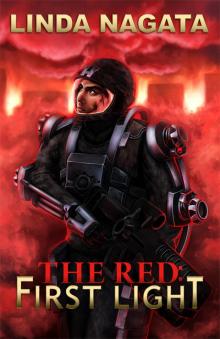 The Red: First Light
The Red: First Light The Martian Obelisk
The Martian Obelisk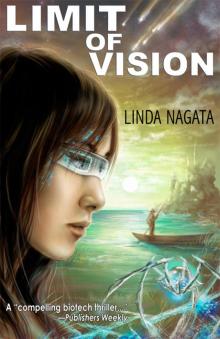 Limit of Vision
Limit of Vision Going Dark
Going Dark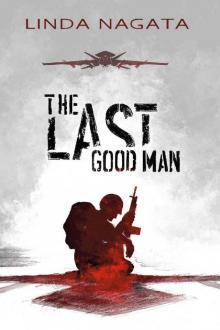 The Last Good Man
The Last Good Man The Trials (The Red Trilogy Book 2)
The Trials (The Red Trilogy Book 2)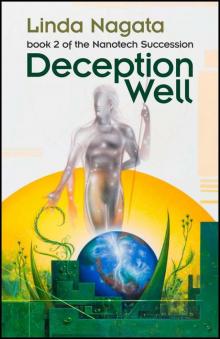 Deception Well (The Nanotech Succession Book 2)
Deception Well (The Nanotech Succession Book 2)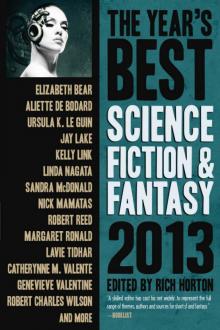 The Year's Best Science Fiction & Fantasy 2013
The Year's Best Science Fiction & Fantasy 2013 The Dread Hammer
The Dread Hammer Skye Object 3270a
Skye Object 3270a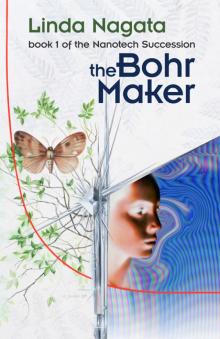 The Bohr Maker
The Bohr Maker